
International Summit on Shaping the Future of Higher Education in Pakistan
June 10-12, 2024 | Islamabad
Objectives
•To bring together leaders and decision makers from universities, industry, and government to hold a dialogue on trends that continue to shape the future of higher education locally and globally.
•To foster knowledge sharing and partnership building opportunities among attendees from diverse backgrounds.
•To showcase success stories and exemplary academic and research practices triggered by HESSA's capacity-building interventions within partner universities.
The USAID’s Higher Education System Strengthening Activity (HESSA) is organizing an International Summit on Shaping the Future of Higher Education in Pakistan from June 10-12, 2024 in Islamabad. The summit is designed to address a spectrum of socioeconomic and knowledge-sharing objectives. We aim to facilitate discussions on key higher education trends, policy issues, and showcase the impactful efforts of USAID in supporting Pakistan's socioeconomic development through higher education initiatives. As such this summit is set to be a pivotal event in shaping the trajectory of higher education in Pakistan. The summit will feature a dynamic agenda comprising plenary sessions, thematic discussions, panel sessions, and the showcasing of best academic and governance practices. We are privileged to host international and national higher education thought leaders, who will share their expertise and ideas to chart the course for a more robust and responsive higher education landscape in Pakistan.
SUMMIT PROGRAM
Monday, 10 June 2024
Tuesday, 11 June 2024
Wednesday, 12 June 2024
Session 1: Positioning Pakistan's Higher Education for Tomorrow
Session 2: Optimizing Faculty Workload: Challenges and Policies
Session 3: Fostering Entrepreneurship Culture in Higher Education Institutions
Session 4: Navigating Tomorrow: Cultivating Higher Education Online and Micro-Credentials in Traditional Landscapes
Session 5: Climate Responsive Water Governance within the Context of Sustainable Development
Session 6: Leadership and Governance Crisis in Pakistani Universities
Showcasing HESSA Best Practices
Session 7: Enhancing Students’ Success through Integrated Support Systems
Session 8:
Innovations in Teaching and Learning for Higher Impact
Session 9: Strengthening Women Leadership Capacities in Higher Education
Session 10: Strengthening the Role of Registrars and Administration in Higher Education
Session 11: The Importance of University - Industry Linkages for Pakistan's Economic Growth
Session 12: Addressing Capacity Building Needs of Higher Education Faculty
Session 1
Theme: Positioning Pakistan's Higher Education System for Tomorrow
-
This session aims to delve into forward-looking approaches that will shape the future of higher education in Pakistan. To this end, speakers will discuss the challenges and opportunities in leveraging technology for learning, strengthening industry-academia collaboration, improving quality standards and accreditation processes, reforming curriculum to meet market needs, and forming international partnerships, among others. Together, these discussions will pave the way for a robust and progressive higher education landscape in Pakistan, poised to meet the demands of tomorrow's world.
Session Chair
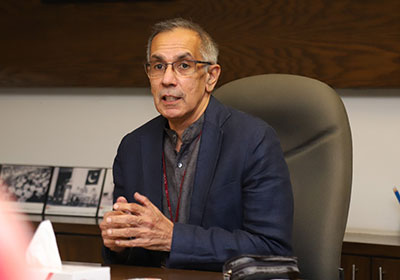

Professor Dr. S. Akbar Zaidi has been the Executive Director of the IBA since January 2020. He is a renowned political economist with an experience of almost four decades of teaching and research in Pakistan and abroad. His areas of interest in research include political economy, development, the social sciences, and history. He completed his PhD in History from the University of Cambridge in 2009, MPhil in Economics from the University of Cambridge in 1993, MSc in Social Planning in Developing Countries from the London School of Economics and Political Science in 1982 and BSc (Hons.) in Economics from University College London in 1980.
Speakers
Presentation topic: A Systems View of Higher Education and Governance
Tariq Banuri holds a Ph.D. in Economics from Harvard University and began his career as a member of the Civil Service of Pakistan (CSP). He has held numerous positions, including Professor of Economics at the University of Utah, former Chairman of the Higher Education Commission, Pakistan, Director of the UN Division for Sustainable Development, founder and first Executive Director of the Sustainable Development Policy Institute (SDPI) in Islamabad, Director of the Asia Centre of the Stockholm Environment Institute (SEI), and Executive Director of the Global Change Impact Studies Centre (GCISC), a statutory corporation established under the GCISC Act 2013. Dr. Banuri has contributed to various national and international forums for policy and research. In recognition of his contributions to research and education, he was awarded the Sitara-i-Imtiaz (SI) in 2002.
Transforming Higher Education in Pakistan: The Impact of Technology, Especially AI
Khalid Hafeez is a strategic thinker and implementer with over 30 years of experience in teaching, research, industry, knowledge transfer, and management at top universities in the UK and the Middle East. He earned a Gold Medal from the University of Balochistan Quetta and was the first Pakistani to receive a Ph.D. in AI and Robotics from Cardiff University of Wales, UK. Dr. Hafeez has held several prestigious positions, including Program Leader for the MEng Program, Director of MBA, and Director of the world’s first MSc in Knowledge Management at Sheffield Hallam University, UK. He was the founding Director of the Centre for Innovation at Bradford University, UK. Later, he served as Professor of Operations Systems & Entrepreneurship and Director of External Relations at the University of York, UK, when it was recognized among the top 100 research universities globally. Renowned globally for his research, he has over 3500 international citations, an h-index of 26, and an i10-index of 44. He is a recipient of the ‘Exemplary Leader’ award from the Asian Leadership Academy UAE and the ‘Certificate of Merit’ from the
Curriculum Innovation and Skills Development for Future Workforce Readiness
Casey Hyun is a multi-award-winning automotive designer and strategist with over 20 years of experience at top automotive and IT companies. He now focuses on future mobility and artificial intelligence. Casey’s extensive global business experience allows him to diagnose and forecast cultural and future trends in creative design. He currently serves as an executive consultant for four Fortune 100 companies, including Google, LG Group, and Continental Automotive.
Advancing Social Equity in Higher Education for a Promising Future
Dr. Mercedes Ward is a design thinker and facilitator who collaborates with individuals and organizations to develop impactful projects, programs, and policies to advance sustainable development. Mercedes believes in the importance of creating enabling environments to support human f lourishing. She accelerated her professional evolution from ecological anthropologist to design thinker when she joined an interdisciplinary, multicultural team to establish a research center for water security in Pakistan. Over a five-year tenure with the USAID-funded U.S.-Pakistan Center for Advanced Studies in Water, she led a Pakistan-based research team to deliver policy recommendations to improve participatory irrigation management, facilitated workshops to support communitybased research and policy impact, and designed and managed quality assurance mechanisms for international education and capacity strengthening programs.
Session 2
Theme: Optimizing Faculty Workload: Challenges and Policies
-
This session will delve into the various challenges associated with effectively managing faculty workload within universities, and exploring the complexities of balancing teaching, research, administrative duties, and other responsibilities encountered by faculty members. Additionally, it will discuss potential policies and strategies aimed at optimizing faculty workload to enhance productivity, job satisfaction, and overall institutional effectiveness.
Session Chair
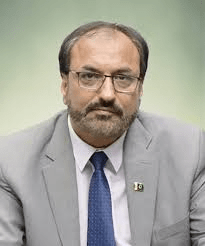

Prof. Dr. Shahid Munir assumed the charge as Chairperson of Punjab Higher Education Commission (PHEC)in June 2022. He brings with him rich experience in the field of academia, industry, research, and administration. Prior to this, he was leading the University of Jhang as Vice-Chancellor. Dr. Shahid Munir has earned his PhD in Energy and Environment Engineering from the University of the Leads, UK.
Speakers
Presentation topic: Faculty Workload and Enabling Environment in Pakistani Public Sector Universities: Policies and Challenges
Prof. Dr. Uzma Quraishi is the Dean of the Faculty of Education, Lahore College for Women University. She is a former Vice Chancellor of the Women University Multan and Lahore College for Women University. She is an eminent educationist and specializes in Gender equity and leadership in Higher Education. Dr Quraishi has a PhD in Educational Management & Planning from the University of Birmingham (UK) & Post-Doc in Gender Equity and Higher Education from the University of Cambridge; MEd in Media and Education, University of Manchester, UK with the first degree in Fine Arts from the National College of Arts Lahore, Pakistan. Dr Quraishi has served on a number of administrative and leadership positions in public and private sector universities, including serving as Principal of the Foundation University College of Liberal Arts and Sciences, Islamabad, Head of departments of Education, Computer Arts and Fine Arts at the Fatima Jinnah Women University, Rawalpindi, Director Institute of Education and Dean of the Faculty of Humanities and Social Sciences, LCWU, Executive Director Women Development Center, and Chairperson Department of Education, UMT, Lahore.
Presentation topic: Balancing Research, Teaching, Service and Life Demands: The Private Sector Perspective
Dr. Faisal Bari currently serves as the Dean of the LUMS School of Education and is an Associate Professor with a joint appointment in Education and Economics. Dr. Bari holds a Doctorate in Economics from McGill University and a master’s degree in philosophy from the University of Punjab. He also has two bachelor’s degrees, one from the University of Oxford and another from Government College, Lahore.
His research encompasses disability inclusion, gender representation in textbooks, the use of educational technology for teacher professional development (TPD), teacher politics, the political economy of teacher recruitment and retention, and the role of the private sector in education reform. He is a member of the Higher Education Commission and has previously served as a Board Member for the Punjab Examination Commission. In this role, he provided technical input for reforming the Punjab examination system towards the adoption of school-based formative assessments.
Presentation topic: Faculty Workload Management: Insights from the University of Utah
Michael Barber is Professor and Chair of Civil and Environmental Engineering (CvEEN) at the University of Utah in Salt Lake City, Utah. Michael has three degrees in Civil Engineering beginning with his BS from the University of New Hampshire, MS from Purdue University, and PhD from the University of Texas-Austin. He has over 30 years of experience in hydrology and water resources working in academics and in private consulting. His responsibilities include administering the CvEEN Department, teaching undergraduate and graduate classes, developing externally funded research proposals and budgets, advising, and supervising undergraduate and graduate students, mentoring and publishing technical papers. Dr. Barber’s research has field investigations and numerical modeling studies of water, nutrients, and primary productivity in rivers and lakes with focus on stream-groundwater interaction, climate change implications, and human adaptation.
Session 3
Theme: Fostering Entrepreneurship Culture in Higher Education Institutions
-
The landscape of higher education in Pakistan is evolving rapidly, with increasing emphasis on preparing graduates for the dynamic demands of the modern workforce. In this context, fostering an entrepreneurship culture within higher education institutions (HEIs) emerges as a pivotal strategy. This session aims to delve into the importance of embedding entrepreneurship within the fabric of HEIs and exploring actionable steps to foster this culture effectively.
Session Chair
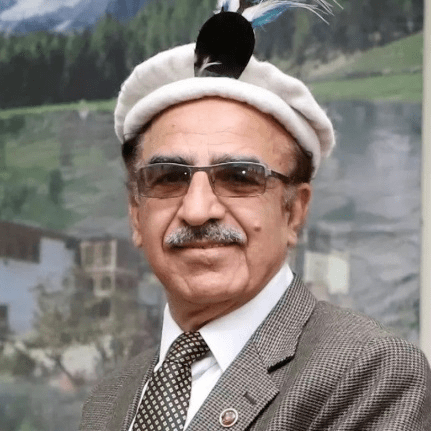

Prof. Engr. Dr. Attaullah Shah is a distinguished researcher, educator, and professional specializing in Civil Engineering, Construction Management, and Sustainable Built Environments. He is currently serving as the Vice Chancellor and Professor of Civil Engineering at City University of Science and IT in Peshawar, Pakistan. Prior to this role, he was the Director of Projects at Allama Iqbal Open University. Dr. Shah also serves as an advisor to the Swedish College of Engineering and Technology Wah, which is affiliated with UET Taxila-Pakistan, for their Civil Engineering program. Additionally, he has been an advisor to the National Foundation for Resource Development for their Construction Management program. He is a visiting faculty member at the Centre of Advanced Studies in Engineering (CASE), SZABIST, and NUST, and is a resource person for PEC CPD courses and the HEC. Dr. Shah has authored over 65 publications in international refereed journals and conferences, covering topics in Structural Engineering, Construction Management, and Sustainable Building Design and Construction.
Speakers
Presentation topic: Promoting Entrepreneurial Mindset in Higher Education
Prof. Dr. Shahid Qureshi is the Rector of GIFT University. He holds a Ph.D. from TU Berlin, an MBA from LUMS, and an MSc from AIT-Thailand. Dr. Shahid is also a fellow of Babson Business School, specializing in entrepreneurship pedagogy, research, and entrepreneurial centers. He has taught at TU Berlin, the Frankfurt School of Finance, Kempton School of Business, and the SP Jain School of Business in Dubai, playing a pivotal role in promoting entrepreneurial education in Pakistan. Previously, Dr. Shahid served as the Director of the Center for Entrepreneurial Development (CED) at IBA Karachi, one of Pakistan's leading business schools. He is a well-regarded researcher and speaker in the field of entrepreneurship and currently serves on the boards of IGNITE (National ICT R&D Fund, Government of Pakistan) and the Board of Intermediate & Secondary Education Karachi. Dr. Shahid has consulted nationally and internationally, aiding in the establishment of entrepreneurial centers. He designed the award-winning Women Entrepreneurship Program course, recognized by the USASBE (United States Association for Small Business and Entrepreneurship) in 2017 and 2021.
Presentation topic: Preparing Faculty and Students for Entrepreneurial Success
Hyun is a multi-award-winning automotive designer and strategist with over 20 years of experience at top automotive and IT companies. He now focuses on future mobility and artificial intelligence. Casey's extensive global business experience allows him to diagnose and forecast cultural and future trends in creative design. He currently serves as an executive consultant for four Fortune 100 companies, including Google, LG Group, and Continental Automotive.
Session 4
Theme: Navigating Tomorrow: Cultivating Higher Education Online and Micro-Credentials in Traditional Landscapes
-
This session will address the increasing importance of integrating online platforms and micro-credential initiatives into Pakistani higher education institutions. While recognizing the necessity of adapting to structural, technological, and cultural changes for launching effective online programs, it emphasizes the benefits and rationale behind such initiatives. Using the example of the technical assistance provided by HESSA to NUST, the session aims to showcase recent developments as inspiration for other institutions.
Session Chair
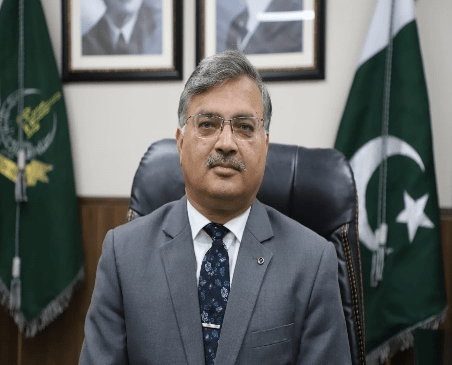

Prof. Dr. Nasir Mahmood has over 25 years of experience in the education sector at various levels. He has taught research methods, educational psychology, and quantitative data analysis to undergraduate, postgraduate, and PhD students at numerous public and private universities. Dr. Mahmood has led or contributed to more than 60 research projects and grants as Principal Investigator, Co-Principal Investigator, and team member. He has published 57 research papers in national and international peer-reviewed journals.
Speakers
Presentation topic: Advancing Online Education and Microcredentials: A Pakistan Case Study
Prof. Hasan is a distinguished academic leader with extensive experience in teaching, research, industry outreach and commercialization, and internationalization. He received his BEng (Hons) degree from the University of Engineering and Technology, Peshawar, Pakistan in 1997, and his MEng and PhD degrees from Concordia University, Montreal, Canada in 2001 and 2008, respectively. After completing his postdoctoral fellowship at Concordia University, he joined the NUST School of Electrical Engineering & Computer Science (SEECS) in 2009, one of NUST's most esteemed institutions. Throughout his career, Dr. Hasan has held numerous key administrative and academic positions. He has served as Principal and Dean of SEECS and previously held the roles of Head of Research and Senior Head of the Electrical Engineering Department at SEECS. His exceptional teaching methods have earned him the HEC’s “Best Teacher Award” in 2011 and the NUST “President’s Gold Medal for the Best Teacher” in 2015. He is a senior member of IEEE, a member of ACM, the Association for Automated Reasoning (AAR), and the Pakistan Engineering Council.
Presentation topic: Advancing Online Education and Microcredentials: A Pakistan Case Study
Deborah is a creative educator and thought leader with over two decades of experience in IT and higher education. As a senior administrator at the University of Utah, Keyek-Franssen works with a talented team to provide digital technologies for teaching and learning on-campus and off; a full range of online education opportunities and services to support those programs including learning experience design, market analysis, marketing, and adult learner support; and a rich set of professional education, workforce alignment, and personal enrichment programs. She began her career at the University of Colorado, where she served as director of academic technology; oversaw strategy and research in the use, implementation, and evaluation of educational technologies; and managed a team of consultants and technologists.
Session 5
Theme: Climate Responsive Water Governance within the Context of Sustainable Development
-
This session will delve into the intersection of climate change, water governance, and employment opportunities in Pakistan. Addressing climate change not only mitigates economic risks but also creates avenues for job creation and improvement, particularly within the context of water governance for sustainable development.
Session Chair
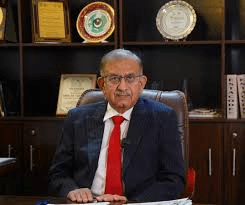

Prof. Dr. S.M. Tariq Rafi graduated in 1982 and joined Jinnah Post Graduate Medical Centre as Medical Officer. He did his F.C.P.S. & F.R.C.S. and became Professor of ENT at Jinnah Post Graduate Medical Centre in 2001. He has been the Convener, Examiner, Paper Setter at College of Physicians & Surgeons Pakistan (CPSP) and has trained more than 100 students for F.C.P.S., M.S. and D.L.O. He has more than twenty-nine publications in national and international journals. He has been the Past President of the Society of ENT and Ex-President of SAARC ENT Society and the former Dean of ENT at College of Physician & Surgeons Pakistan and the former Vice Chancellor of Jinnah Sindh Medical University, Karachi. He has been awarded with the civil award of Tamgha-i-Imtiaz by the President of Pakistan in recognition of his contributions to education and health in the country.
Speakers
Presentation topic: Evolving University Organizations and Programs to Address Climate Change Impacts on Water
Sajjad is a professor of water resources and a senior water management expert with a broad background. He has over 20 years of experience in hydrologic and hydraulic modeling, integrated water resources management, climate change impacts, water-energy nexus, urban water use efficiency, water policy, teaching, and training. As an educator, Dr. Ahmad has supervised 32 graduate students to successfully complete their MSE or Ph.D. degrees. Dr. Ahmad has published 118 papers in peer-reviewed journals and more than 100 book chapters or papers in conference proceedings on a variety of research topics related to hydrology and water resources planning and management. His publications have been cited more than 9300 times (h-index 58; i-10 index 127. source Google Scholar) He is a Fellow of the American Society of Civil Engineers (ASCE), and the recipient of the NSF CAREER Award. He serves on the Editorial Board of eight international Journals, including ASCE Water Resources Planning and Management. Dr. Ahmad holds a Ph.D. in Civil Engineering (Water Resources) from the University of Western Ontario, Canada, and an M.Sc. in Water Resources from the Asian Institute of Technology, Thailand. He received his BSc in Civil Engineering from the University of Engineering and Technology, Lahore Pakistan.
Presentation topic: Adapting Capacities of Faculty Members and Students to Combat Climate Change Effects on Water
Steve Burian is a Professor of Hydrology and Water Resources in the Department of Civil, Construction and Environmental Engineering at the University of Alabama. He also serves as the Director of Science at the Alabama Water Institute. Dr. Burian helps to catalyze multi-disciplinary water initiatives in research, education, global engagement, and community impact. His research group develops solutions to reduce risk from floods and other water-related hazards, improve performance of water systems from building to urban scales, and protect clean water. Using computer modeling, hydroinformatics, systems analysis, and field studies, his research group contributes to the engineering of sustainable and resilient urban water infrastructure systems, including stormwater, wastewater, and water supply; works in partnership with local stakeholders, such as the Salt Lake City Department of Public Utilities; and is supported by local, federal, and international funding sources. In teaching, he advances the use of project-based learning to build soft skills of students and to address critical local and global water problems in courses such as Water Resources Planning and Management, Hydroinformatics, and Sustainable Urban Water Engineering. In 2019, recognizing his effort advancing faculty capacities and higher education systems in Pakistan, Dr. Burian was awarded the Sitara-i-Imtiaz by the President of Pakistan.
Presentation topic: Strategic Planning and Partnerships in Higher Education to Enhance Water System Resilience to Climate Change
Michael Barber is Professor and Chair of Civil and Environmental Engineering (CvEEN) at the University of Utah in Salt Lake City, Utah. Michael has three degrees in Civil Engineering beginning with his BS from the University of New Hampshire, MS from Purdue University, and PhD from the University of Texas-Austin. He has over 30 years of experience in hydrology and water resources working in academics and in private consulting. His responsibilities include administering the CvEEN Department, teaching undergraduate and graduate classes, developing externally funded research proposals and budgets, advising, and supervising undergraduate and graduate students, mentoring and publishing technical papers. Dr. Barber’s research has field investigations and numerical modeling studies of water, nutrients, and primary productivity in rivers and lakes with focus on stream-groundwater interaction, climate change implications, and human adaptation.
Session 6
Theme: Leadership and Governance Crisis in Pakistani Universities
-
Four panel speakers will discuss their perspectives on the major challenges facing higher education in Pakistan. They will offer three to five priorities that vice-chancellors should be acting upon to address these issues. The outlined priorities will provide actionable strategic directions related to self-sufficiency and autonomy for individual institutions as they navigate ongoing funding challenges. The priorities will be built around empowering faculty members, responding to societal needs, addressing gender and diversity disparities, navigating the legal and regulatory framework, fostering stakeholder engagement, and other objectives outlined by each speaker. These priorities will be issues that vice-chancellors should address with their leadership councils and communities in their strategic planning.
Session Chair
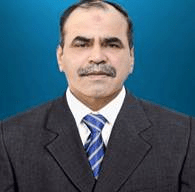

Lt. Gen. (Retd.) Moazzam Ejaz, Rector, National University of Technology, Hilal-e-Imtiaz (Military), joined Pakistan Army Corps of Engineers in 1985 and retired in 2022. He is a civil engineering graduate with 30 plus years of professional experience in engineering, project management, administration, and academics. During his long and meritorious career, he has made very valuable contributions towards engineering profession. He has held prestigious appointments of Quarter Master General and Engineer-in-Chief of Pakistan Army. He holds a Master of Science in War Studies and Defense Management from National Defense University, Islamabad. Engr. Ejaz has held numerous advisory, administrative, and consultative positions across several organizations. As member Governing Body Pakistan Engineering Council over the years, he has played an active role in undertaking various initiatives to strengthen engineering community. He has been awarded Lifetime Achievements Award by PEC and Excellence Award by Institute of Engineers Pakistan.
Speakers
Presentation topic: Inter-sectoral Challenges and Advancement in Education Sector
Shahnaz Wazir Ali, a recipient of the Sitara-e-Imtiaz, has had an illustrious 40-year career as an educationist and social sector development policy specialist. She has been elected twice to the National Assembly of Pakistan and has served as Special Assistant to the Prime Minister on Social Sectors. She is also a renowned women's rights activist. Since 1965, she has been a Trustee of the Education Trust Nasra School in Karachi. Her lifelong commitment includes significant involvement in polio eradication, family planning, population issues, education sector reform, and social protection. Dr. Wazir Ali's extensive experience includes serving as a Senior Education Specialist at the World Bank and as the Minister of State for Education for the Government of Pakistan. She has held positions on the boards of numerous prestigious national and international organizations, trusts, advisory councils, and educational boards, including IBA, Sindh HEC, the Higher Education Commission, the Benazir Income Support Program in Islamabad, the Social Policy Development Centre (SPDC), the Women’s Action Forum (WAF), the Executive Board of UNESCO, the National Curriculum Council, and the Patients Aid Foundation at Jinnah Postgraduate Medical Centre in Karachi.
Presentation topic: University Research System, Challenges and Opportunities
Dr. Zain Ul-Abdin did his PhD in Computer Science from Örebro University, Sweden in 2011. He has a diverse experience of raising more than 650 million equivalent in PKR in research funding from both national and international funding agencies such as Vinnova, SSF, Knowledge Foundation, ELLIIT in Sweden, EU-FP7 at European level and National ICT R&D Fund in Pakistan. Dr. Abdin has worked in collaboration with industrial partners such as ST-Microelectronics, Ericsson, Adapteva, Ambric, and Saab Electronic Defence Systems in these projects. At Higher Education Commission of Pakistan, he has managed research portfolio with an annual turnover of 3.5 Billion PKR. He has been instrumental in the digital transformation of the R&D Wing of HEC as well as introducing policy reforms to revamp the research grants framework and the research management system.
Presentation topic: Selection Process and Leadership Crisis at Public Sector Universities Need for Reform, and the Way Forward
Dr. Ishtiaq Ahmad has been the Member of Development Communication at the Planning Commission since September 2022. He brings a wealth of experience in journalism, education, and development communication, and his primary role is to champion development discourse in Pakistan through impactful communication strategies. With a distinguished career spanning three decades, Dr. Ahmad has made significant contributions to academia and the media. He served as Vice Chancellor at the University of Sargodha from 2016 to 2021, where he implemented academic reforms and oversaw critical projects. As the Pakistan Chair at Oxford University from 2010 to 2015, he effectively promoted a positive image of Pakistan within British academia. Dr. Ahmad's diverse professional portfolio includes roles at Quaid-e-Azam University and Eastern Mediterranean University. He began his career in journalism, contributing to leading publications. A recipient of prestigious fellowships, his expertise extends to Pakistani politics, foreign policy, and global affairs.
Presentation topic: Issues in Selection and Support of Leaders for Higher Education and the Way Forward
Faisal Bari currently serves as the Dean of the LUMS School of Education and is an Associate Professor with a joint appointment in Education and Economics. Dr. Bari holds a Doctorate in Economics from McGill University and a master’s degree in philosophy from the University of Punjab. He also has two bachelor’s degrees, one from the University of Oxford and another from Government College, Lahore. His research encompasses disability inclusion, gender representation in textbooks, the use of educational technology for teacher professional development (TPD), teacher politics, the political economy of teacher recruitment and retention, and the role of the private sector in education reform. He is a member of the Higher Education Commission and has previously served as a Board Member for the Punjab Examination Commission. In this role, he provided technical input for reforming the Punjab examination system towards the adoption of school-based formative assessments.
Breakout Sessions
Showcasing HESSA Best Practices (4 parallel sessions)
Enhancing Students’ Success through Integrated Support Systems
Moderators:
Dr. Randy McCrillis
Dean of Students at University of Utah Asia Campus
Ms. Asma Mohsin
Program Manager, IIE/HESSA
Theme: Innovations in Teaching and Learning for Higher Impact
Moderators:
Dr. Lisa Pawloski
Professor & Associate Dean, College of Arts and Sciences, University of Alabama, USA
Dr. Steve Burian, Professor
Civil, Environmental and Construction Engineering, University of Alabama, USA
Theme: Strengthening Women Leadership Capacities in Higher Education
Moderator:
Dr. Susan Carvalho
Dean of Graduate School, University of Alabama, USA
Theme: Strengthening the Role of Registrars and Administration in Higher Education
Chair:
Dr. Amjad Saqib
Founder Akhuwat Foundation
Moderator:
Dr. Tariq Banuri, Professor of Economics
University of Utah, USA
Session 11
Theme: The Importance of University - Industry Linkages for Pakistan’s Economic Growth
-
The session will discuss and examine an analysis of student expectations and experiences; alumni perspectives on industry partnerships and how universities can collaborate with employers to ensure graduates are adequately prepared for the workforce, including discussions on internships, skill development initiatives, and strategies for bridging the academia-industry gap. Finally, the session will explore various approaches to engaging students in decision-making processes within higher education institutions, emphasizing transparency, responsiveness to students’ feedback, and fostering a culture of inclusivity in governance structures.
Session Chair
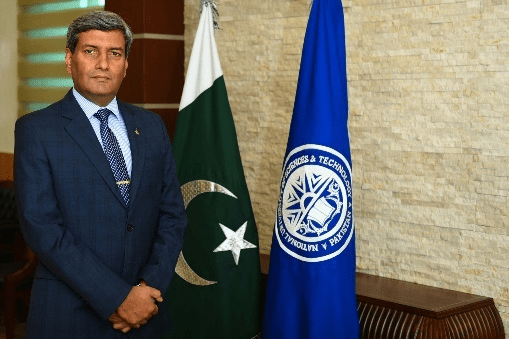

Dr Rizwan Riaz assumed the office of Pro-Rector for Research, Innovation & Commercialisation at NUST in April 2021, bringing with him extensive experience in academics, research and technology management. His affiliation with NUST dates back to 2008 as faculty member and, recently, as Principal Research Centre for Modelling & Simulation (RCMS), NUST. A graduate in Aeronautical Engineering from the US Air Force Academy, Colorado Springs, USA, with distinction in 1990, he obtained Masters in Aerospace Engineering from NUST, Pakistan, in 2004 and PhD in Mechanical Engineering (Computational Fluid Dynamics) from the University of Manchester, UK, in 2008. Dr Rizwan Riaz has over a decade of experience in R&D, project management, organisational R&D policy, and academia-industry linkage measures. An avid proponent of applied research, Dr Rizwan has been part of national-level projects which have won him laurels and saved the nation millions in foreign exchange. In recognition of his meritorious services, he has also been awarded Sitara-i-Imtiaz (Military).
Panelists
Session 12
Theme: Addressing Capacity Building Needs of Higher Education Faculty
Session Chair
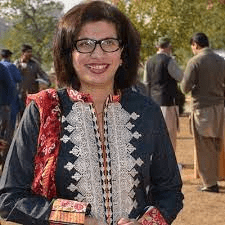

Speakers
Presentation topic: The Need for Different Faculty to Meet New Curriculum and Pedagogical Demands
Dr. Pawloski is the Associate Dean for International Programs and a Professor of Anthropology in the College of Arts and Sciences. Her previous roles included founding Chair of the Departments of Nutrition and Food Studies and Global and Community Health at George Mason University. She also served as Dean of Academic Affairs on the George Mason University Korea campus in Songdo Korea. Dr. Pawloski is an expert in childhood obesity and biocultural aspects of health and nutrition among children, adolescents, and young adults. As a Fulbright Scholar in 1997, she examined the nutritional status of adolescent girls from the Segou Region in Mali, West Africa to explore factors impacting malnutrition in that region. Her current interests involve exploring the biocultural, geographic, and social determinants of obesity in transitional countries. Dr. Pawloski has most recently worked and conducted research in Thailand, Iraq, Costa Rica, Nicaragua, Chile, and Paris, France.
Presentation topic: Embracing the Mindset of the 21st Century
Dr. Steve Burian is a Professor of Hydrology and Water Resources in the Department of Civil, Construction and Environmental Engineering at the University of Alabama. He also serves as the Director of Science at the Alabama Water Institute. Dr. Burian helps to catalyze multi-disciplinary water initiatives in research, education, global engagement, and community impact. His research group develops solutions to reduce risk from floods and other water-related hazards, improve performance of water systems from building to urban scales, and protect clean water. Using computer modeling, hydroinformatics, systems analysis, and field studies, his research group contributes to the engineering of sustainable and resilient urban water infrastructure systems, including stormwater, wastewater, and water supply; works in partnership with local stakeholders, such as the Salt Lake City Department of Public Utilities; and is supported by local, federal, and international funding sources. In teaching, he advances the use of project-based learning to build soft skills of students and to address critical local and global water problems in courses such as Water Resources Planning and Management, hydroinformatics, and Sustainable Urban Water Engineering. In 2019, recognizing his effort advancing faculty capacities and higher education systems in Pakistan, Dr. Burian was awarded the Sitara-i-Imtiaz by the President of Pakistan.
Presentation topic: Reimagining Higher Education Centers for Faculty Development
Dr. Akifa Imtiaz is a curriculum designer, professional development facilitator, and teacher-researcher. She's dedicated to both shaping young minds and empowering educators. Her dedication has been recognized with prestigious awards like the Fatima Jinnah Best Teacher Award and the 2022 Research Productivity Award. Dr. Imtiaz currently leads the English Department at Fatima Jinnah Women University in Rawalpindi as an Associate Professor and Chair.
Presentation topic: Preparing Faculty to Escape Disciplinary Silos
Jim Agutter is an Associate Professor in the College of Architecture + Planning, the Director of the Spark Design Initiative and the Director of the Bachelor of University Studies in the Office of Undergraduate Studies. He is the founder and past director of the Multi-Disciplinary Design Program and the CEO of Applied Medical Visualizations. He has worked on innovation and information design challenges for more than 18 years. Jim's research has focused on the application of 2D and 3D design concepts to large scale, real-time data environments. He has published extensively in the area of information visualization and design challenges in healthcare and cyber-security. In addition, he has numerous technology solution patents, many of which have transferred to industry. Jim has received numerous awards for his work including the 2004-2005 Creative Achievement Award by the Association of Collegiate Schools of Architecture, 2009 University of Utah Honors Professorship, 2013 Early Career Teaching Award, 2014 University of Utah Beacon of Excellence Award and the 2016 University of Utah Distinguished Innovation and Impact Award.
SUMMIT CONTACT
HESSA Project, University of Utah, SLC, USA
Dr. Michael Barber, Project Director HESSA, michael.barber@utah.edu
Dr. M. Aslam Chaudhry (Convenor), Associate Project Director HESSA, aslam.chaudhry@utah.edu
HESSA Project, Islamabad, Pakistan
Dr. Kenneth Holland, Chief of Party HESSA, kenneth.holland@utah.edu
Dr. Ayesha Razzaque, Deputy Chief of Party HESSA, ayesha.razzaque@utah.edu
Mr. Arsal Latif, Communication Expert, arsal.latif@utah.edu
Mr. Naveed Ali, Operations Manager, naveed.ali@utah.edu

![]()

This program is made possible by the support of the United States Government and the American people through the United States Agency for International Development (USAID). The contents are the sole responsibility of the University of Utah and do not necessarily reflect the views of USAID or the U.S. Government.
